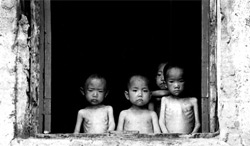Economic Justice
Congresswoman Stephanie Tubbs Jones was a Cleveland original. Stephanie never cared about “style points.” She only cared about passing public policy that served the common good. No one matched her passion, energy, or voice for the poor and vulnerable. Everyone wanted her on their side. She was ever present in her 11th Congressional District and was tireless in her advocacy for victims of predatory lending, the uninsured, the unemployed, and children. The news [...]
I've been on lots of roads trips, but none of them compare to The Walnut Hills Fellowship's weekend journey to Chicago. Start to finish, it was a thing of rare beauty. We had been talking about it for months, of course, but I think most of our neighborhood friends still didn't really believe it was going to happen. After all, people around here are always talking about things they don't really intend to do. [...]
[... continued from part 1]
All I'm trying to say is that whether we wear the label of Christian conservative or Christian liberal, what matters most is that we are Christian. The Bible reminds us that there is no male or female, Jew or gentile, bond or free, but in Christ we are all the same, sinners saved by grace.
What I've learned is that many of my liberal and [...]
It wasn't until I started working in the world of religion and politics with advocacy organizations on Capitol Hill that I ever heard anyone define Christians as liberal or conservative. These terms were not used in my church experience. But when I recall different experiences working in the church, I can see how some members of the churches where I worshiped then, where I worship now, and in congregations across the country, fit into these categories. I've found it difficult to [...]

Rt. Rev. Mark Dyer, an Anglican bishop known for his wit as well as his wisdom, famously observes from time to time that the only way to understand what is currently happening to us as 21st-century Christians in North America is first to understand that about every 500 years the church feels compelled to hold a giant rummage sale. And, he goes on to say, we are living in and through one of those 500-year sales.
While the bishop may be using a bit of humor to make a point, his is nonetheless a deadly serious and exquisitely accurate point. Any usable discussion of the Great Emergence and what is happening in Christianity today must commence with a discussion of history. Only history can expose the patterns and confluences of the past in such a way as to help us identify the patterns and flow of our own times and occupy them more faithfully.
The first pattern we must consider as relevant to the Great Emergence is Bishop Dyer’s rummage sale, which, as a pattern, is not only foundational to our understanding but also psychologically very reassuring for most of us. That is, as Bishop Dyer observes, about every 500 years the empowered structures of institutionalized Christianity, whatever they may be at that time, become an intolerable carapace, or hard shell, that must be shattered in order that renewal and new growth may occur. When that mighty upheaval happens, history shows us, there are always at least three consistent results or corollary events.
First, a new, more vital form of Christianity does indeed emerge. Second, the organized expression of Christianity that up until then had been the dominant one is reconstituted into a more pure and less ossified expression of its former self. As a result of this usually energetic but rarely benign process, the church actually ends up with two new creatures where once there had been only one. That is, in the course of birthing a brand-new expression of its faith and praxis, the church also gains a grand refurbishment of the older one.
Andrew Berg, an International Monetary Fund African department policy adviser, is a nice man. I know this because he spent some time talking earnestly with me after an IMF press conference in which I'd asked a pretty confrontational question about Malawi, whose 2002 famine is often partly attributed to IMF (and World Bank) advice, and whose current bumper crops are attributed to ignoring it.
Berg looks a tiny bit like The X Files' Agent Skinner, but what this conversation [...]
In January of 1964, President Johnson declared "unconditional war on poverty in America." In response, the Census Bureau created a methodology for establishing an "official poverty line," determined the number of people whose incomes fell below the line, and calculated the poverty rate. The formula for determining poverty was based on the assumption that food costs consume one-third of a family's after-tax income -- an assumption that is still used today, though food now constitutes [...]
[ ...continued from part one]
So how do we help people who have been hurt so much psychologically and emotionally that they don't believe in themselves and don't believe they deserve better? How do we help children who have never heard a parent say, "I love you, you are special, talented, and will do great things one day"? Or those who watched their parents harm themselves through substance [...]
During this election cycle, we have heard candidates talk about ways in which we can work to end poverty. John Edwards has a new initiative to cut poverty in half in 10 years. These and other initiatives are certainly admirable ideas and much-needed programs that could help millions of men, women, and children.
In additions to programs and needed policy changes from our elected officials, we are also hearing about personal responsibility. And yes, inasmuch as [...]
 My great-grandfather was one of the first Christians in a village near Pyongyang. God's grace was poured over his entire family, but they experienced intense persecution because of their faith. As a result, he "escaped" one night with his entire family from what is now known as North [...]
My great-grandfather was one of the first Christians in a village near Pyongyang. God's grace was poured over his entire family, but they experienced intense persecution because of their faith. As a result, he "escaped" one night with his entire family from what is now known as North [...]
 It's clear that one cause of the current food crisis is that poorer countries have been pressured into dismantling their food policies, leaving peasant farmers and eaters alike to bear all the risks of the extremely volatile world market. This has left corporations free to ship factory-farmed food to those countries, peasants free to migrate to urban slums, and corporately-dominated economic [...]
It's clear that one cause of the current food crisis is that poorer countries have been pressured into dismantling their food policies, leaving peasant farmers and eaters alike to bear all the risks of the extremely volatile world market. This has left corporations free to ship factory-farmed food to those countries, peasants free to migrate to urban slums, and corporately-dominated economic [...]
I grew up in a working-class, African-American neighborhood in Detroit. I was fortunate to have two college-educated parents who knew how to set my brother and me up for success in school. They also knew how to navigate the public school system to ensure we got the best education possible. That support helped me gain entry into a competitive college prep public high school. My path to college was clear: 99 percent of the graduates at my high school went on to four-year colleges and [...]
As you were singing carols, placing the last presents under the tree, and worshiping at a Christmas Eve service this past year, Indian Christians halfway across the world were being victimized by the largest attack on the Christian community in India's democratic history. The complex and combustible layers of caste-based oppression and religious persecution came to a head on Dec. 24, 2007, through a spate of violence in the Kandhamal District of Orissa state. During the course of [...]
I was in Zimbabwe from June 21 to 28. I traveled by bus, and my experience is typical of what has become the norm for road travel between South Africa and Zimbabwe -- long queues and delays at the border posts and police-controlled roadblocks.
Almost all vehicles going to Zimbabwe are loaded to maximum capacity with goods from South Africa -- mostly basic foodstuff. With ever-rising inflation currently at 3 million percent, the Zimbabwean dollar cannot keep up, and the government [...]
I was in Zimbabwe from June 21 to 28. I traveled by bus, and my experience is typical of what has become the norm for road travel between South Africa and Zimbabwe -- long queues and delays at the border posts and police-controlled roadblocks.
Almost all vehicles going to Zimbabwe are loaded to maximum capacity with goods from South Africa -- mostly basic foodstuff. With ever-rising inflation currently at 3 million percent, the Zimbabwean dollar cannot keep up, and the government [...]
I was in Zimbabwe from June 21 to 28. I traveled by bus, and my experience is typical of what has become the norm for road travel between South Africa and Zimbabwe -- long queues and delays at the border posts and police-controlled roadblocks.
Almost all vehicles going to Zimbabwe are loaded to maximum capacity with goods from South Africa -- mostly basic foodstuff. With ever-rising inflation currently at 3 million percent, the Zimbabwean dollar cannot keep up, and the government [...]
In the wake of Sen. Obama's proposals on faith-based initiatives, I listened to political pundits characterize this as simply another shift by Obama toward the political "center." All this knee-jerk analysis totally misses the point.
I've followed the development of this idea for years. In September 2000 I was at a breakfast for religious leaders at the White House when President Clinton [...]
As our motorcade approached the Dalit village of Nayagarh, we could see the bright and brilliant image of 500 Dalit women gathered to welcome us, their saris forming a kaleidoscope of color. Cheers and whistles erupted from the crowd of women as we approached. I felt like a presidential candidate as I passed through the crowd, shaking as many hands as I could reach, wanting to make human contact with women whose dignity is so often demeaned and whose worth too often dismissed. These women [...]
"Grain Markets Panic Buying, Export Controls, and Food Riots," trumpets the headline of one Web site I read while researching the world food price crisis for Sojourners' July issue. Was the site a moral [...]